#753 BC
Explore tagged Tumblr posts
Text

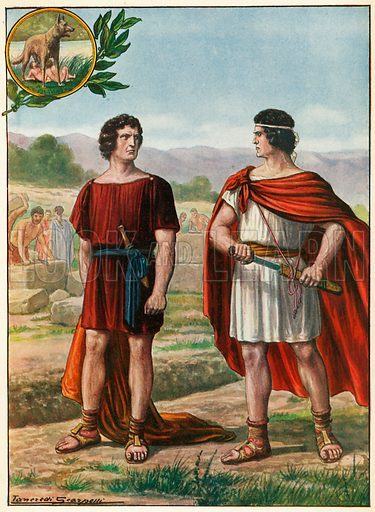


Mickey Mouse and Oswald the Lucky Rabbit as Romulus and Remus, as the founders of Rome - Toon History - History in Duckverse and Mouseverse - Happy Birthday to the Best City!
Yes, it's time to change my plans now with my new project called Toon Historia, also History in Duckverse and Mouseverse in which our famous cartoon and comic characters play famous historical figures and will play in important historical events . And first I drew Oswald the Lucky Rabbit and Mickey Mouse as the founders of Rome, as Romulus and Remus. Romulus and Remus, according to Roman mythology and Roman tradition, were the sons of Rhea Sylvia and the god Mars and grandsons of King Numitor. Numitor's brother Amulius overthrew his brother and ordered the execution of his children, including the sons of Sylvia who were thrown into the Tiber River. However, according to legend, a she-wolf found them and raised them until the shepherd Faustulus came along and adopted them. Afterwards they grew up and when they heard the truth, they went to overthrow Amulius and succeeded and restored their grandfather Numitor to be king of the city of Alba. Afterwards, Romulus and Remus went to seven hills in the valley of the Tiber River and there on April 21, 753 BC they founded the eternal city, which will be called Rome. Yes, there was a conflict between the two in which Romulus killed his brother (a tragic event) and thus took the title of the first king of Rome.
Oswald and Mickey who were created by Ub Iwerks and Walt Disney in 1927 and 1928 also became the first Disney icons, however the conflict between Iwerks and Disney resulted in Oswald being part of Universal, until in 2006 Disney bought the rights to Oswald. Yes, that's why I drew Mickey and Oswald as Romulus and Remus, because of that parallel, but don't worry, Mickey won't kill his brother, even though mice and rabbits are not the same species, they are still considered brothers because of Epic Mickey. As Romulus and Remus were the founders of Rome, so Oswald and Mickey were the founders of the new world.
I drew this last year, but I waited for this moment to publish now and I drew it as a redraw from an illustration by Tancredi Scarpelli (1866–1937) for Storia d'Italia by Paolo Giudici (Nerbini, 1929). I drew Mickey in my own style, while I left the old look for Oswald, because I still like him better with dot eyes. And yes, I drew this on the occasion of the 100th anniversary of the creation of Disney as well as the 75th anniversary of Topolino magazine, which is published in Italy, and the capital of Italy is definitely Rome. Yes, Rome, the eternal city and capital of one of the greatest empires and greatest civilizations of all time. As well as related to the birthday of the City of Rome, which is celebrated on April 21 every year. Happy Rome Day! Roma Aeterna!
I hope you like this drawing and this idea and if you want to support feel free to like and reblog this! I just ask that you don't copy my same ideas without mentioning me and without my permission. Thank you! Happy Rome Day, my favorite city in the world!
#my fanart#mickey mouse#oswald the lucky rabbit#topolino#disney#artists on tumblr#my redraw#romulus and remus#rome#history#ancient rome#mouseverse#comics#cartoons#epic mickey#mickey and oswald#toon history#duckverse in history#mouseverse in history#753 BC#21th April#disney mouse#disney rabbit#fanart#my style#my art#art#disney fanart#roma aeterna#classic disney universe
30 notes
·
View notes
Text
Ride 753: Bird's eye-view
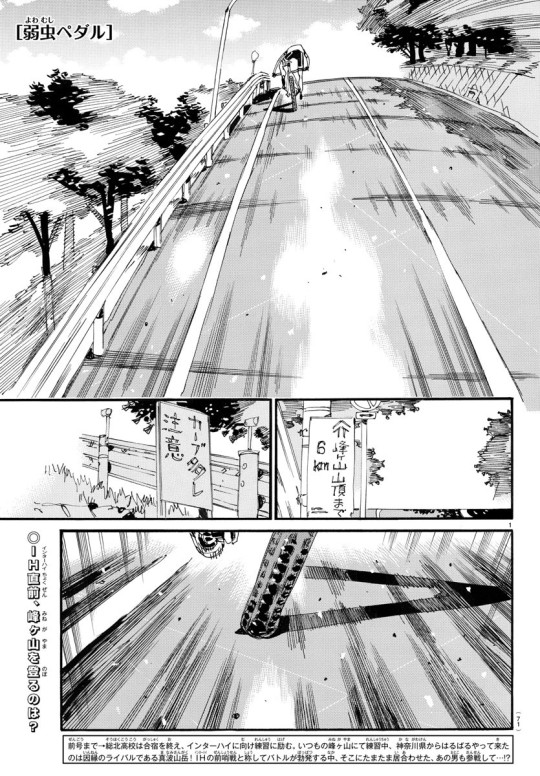



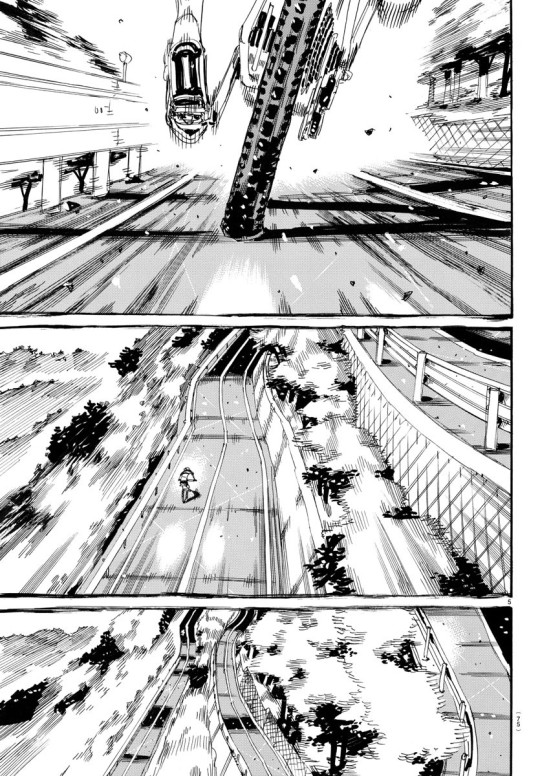
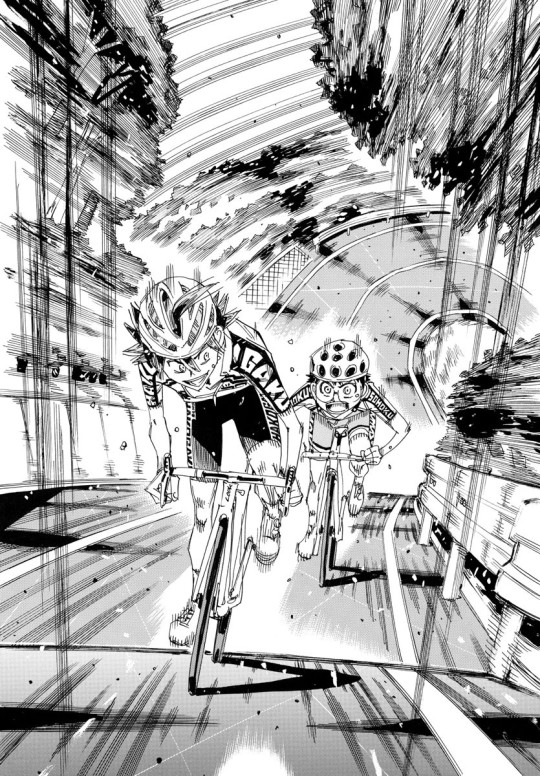



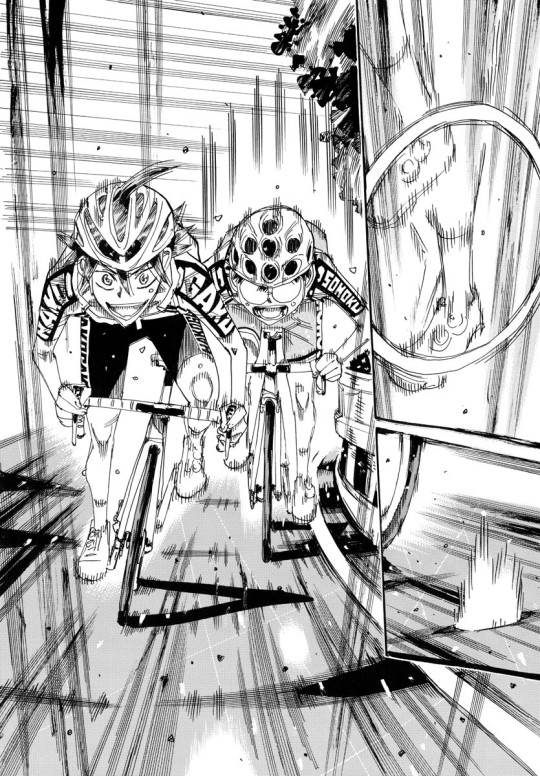

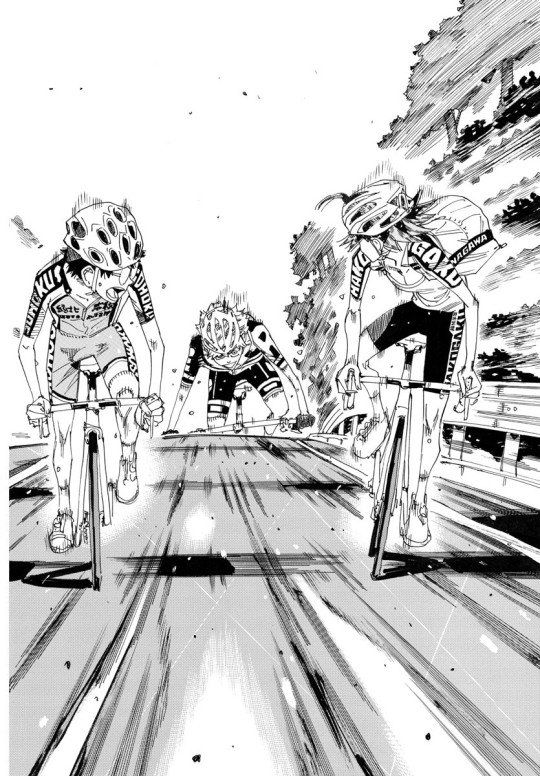






Pag 18
5: That day, three people climbed on the Minegayama

Pag 19
1: The first one to arrive, surpassing by 10 seconds the course record made three years before on that same mountain by Makishima Yuusuke
2: was the man wearing the blue jersey

Pag 20
3: 12 seconds after him, was the man wearing the yellow jersey
4: And then, 48 seconds after, appeared the figure of the mean riding a mountain bike

Pag 21
1: One week after this
2: Those three people will move the stage to Kyuushu
3: and fight again

Pag 22
1: For Onoda Sakamichi is the start of his last summer Inter High
#yowamushi pedal#yowamushi pedal translations#yowapeda#yowapeda manga#yowamushi pedal manga#yowamushi pedal spoilers#ride 753#you people could have read this without my help lmao a mute chapter!!!!#amazing how intense a mute chapter can be!#i have two different opinion on this chapter#1st: noooo i wanted to see this race better!! I wanted to see what they say to each other and what theyre thinking and everything else!!#2nd: actually it makes sense that watanabe didnt show this to us in details bc i bet we will see a race between these three again during th#the ih* and ofc it makes sense that the first time we see them properly is during the IH#also i bet that when that happens we'll see flashbacks of this race#also: manami finally winning against onoda????? you go boy!!#12seconds of difference between them is A LOT wtf#that kiji is so far behind makes sense both bc he just started road racing but especially bc hes riding a mtb#but onoda??? the ih is in a week baby you cant be so much weaker than manami???#even though it must be said that every year hakogaku shows up and is so so much stronger than everyone#and they win everything at the ih#but in the end manami loses anyway lmao sorry baby i love you but its the truth#ANYWAY NEXT CHAPTER THE IH IS STARTING I GUESS!!!!#it's been 200 chapters since the end of the second ih can you believe???#amazing
117 notes
·
View notes
Video
Ancient Rome. Romantic Techno Mix DJ Francuz
#youtube#djfrancuz ancientrome romantic Ancient Rome began as an Italic settlement traditionally dated to 753 BC beside the River Tiber in the Ita
0 notes
Text
Understanding Roman Legend

Numitor, king of Alba Longa, was dethroned and taken prisoner by his younger brother, Amulius, who, after killing his nephews, forced his niece Rhea Silvia to enter the temple of the Vestal Virgins so that she could not have offspring. But the god Mars and Rhea Silvia fell in love. Mars fathered the twins Romulus and Remus.

Mars and Rhea Silvia (1617) by Rubens. Liechtenstein Museum
Amulius, fearing that he would have two rivals in the future, ordered the newborns to be killed. The man in charge of the infanticide did not dare to do it but he placed the babies in a basket and left them to their fate in the Tiber River. The current carried the basket to a swamp called Velabrum, between the Palatine and Capitoline hills.
In the cave known as Lupercal they were suckled by a wolf called Luperca. According to Plutarch in 'Parallel Lives: Romulus', Luperca was the sacred animal of Mars.
Shortly afterwards they were found by the shepherd Faustulus, who was working for Amulius, so he knew very well who those babies were. He decided to secretly care for the children together with his wife Acca Larentia.

The Shepherd Faustulus bringing Romulus and Remus to his wife. Nicolas Mignard (1654) Dallas Museum of Art.
When they grew up did he reveal his true identity to them and they decided to do justice. They killed Amulius and freed their grandfather from prison, who was reinstated on his throne.
Why sons of Mars and not of another god or a king?


Mars was the god of war and the army, virility, violence, revenge, and courage: all these attributes was the essence of Ancient Rome, rather the Roman army.
On the other hand, if the twins had been the sons of a man, even a king or a great warrior, they would have been ordinary men. That was a clear message to the Romans: they were not like the others; their army was not to be one among many.
Why a she-wolf?

The first food was not mother's milk or the milk of a tame animal but of a fearsome predator; A powerful message to the Romans about who they were, where they came from and where they should go. Engendered by the war, fed by ferocity; Their duty was to always be aggressive and feared by their enemies. Roman soldiers remembered at every step: “ We are sons of Mars and the Capitoline she-wolf”. And Rome, like the she-wolf called Luperca, was also capable of protecting its allies.
The foundation of Rome

The twins left their hometown of Alba Longa as they wanted to rule without overthrowing their grandfather. Romulus wanted to build a new city called Rome on the Palatine Hill, but Remus wanted to call it Remoria on the Aventine Hill. They decided that whoever saw the most vultures would win the dispute. Remus saw six and Romulus twelve.
According to tradition, Romulus founded Rome by drawing its sacred border on the afternoon of 21 April 753 BC.
Romulus had declared that no one could cross the borders of the city in arms; his brother disobeyed and crossed the limits carrying a sword, thus violating the sanctity of Rome. Romulus became enraged and a heated argument and subsequent armed confrontation began between the twins. Remus was seriously wounded and died hours later. Romulus held a funeral for his brother and buried his remains at the place where Remus had wanted to found his city Remoria.
Why a story about twins?

Romulus and Remus (1615) by Rubens. Capitoline Museums
The fact that they were twins, and not an older and a younger brother, was to make it clear that the god Mars was the father of both, and that they were 100% brothers.
So there was no doubt that Romulus and Remus represented all Romans, both in good times, when they were united and fighting for a common cause, and in times of division and conflict.
The fratricide was not premeditated. The fight was not for ambition or for a woman, it was for Rome. This story taught that, for the good of Rome, civil wars could be fought, as many as necessary.

Romulus and Remus. Silver didrachm (6.44 g). c. 269–266 BC. Photo: Curtius http://creativecommons.org/licenses/by-sa/3.0/
85 notes
·
View notes
Text
BC/AD or BCE/CE ????
I've been using BC/AD just because I'm old skool and I don't really care about the religious connotations whatsoever and honestly I don't care one way or the other. In fact I would rather use the Roman dating system with the year 753 BC as year zero (just kidding). But some people passionately have a stance on this.
So I'm going to hold a week long official poll in order to leave it to you.. The People. Note that if BCE/CE wins changes won't happen overnight as I'm not going through my 650 post queue to change everything.
586 notes
·
View notes
Text
OLDER : 10. cut the bullshit

















prev. | next | masterlist
NOTES: AND THUS ENDS ACT ONE HOLY SHIT !!! um… u guys might hate me bc of the next 2 chapters teehee 💋 anyw kuni is the only one the mc feels comfy with talking to abt her worries and often vents to him. they’re extremely close and consider themselves platonic soulmates. that’s why kuni says that he’s the only one she can talk to abt stuff, and it’s actually true 👍
SUMMARY: when your acting career booms, the stress of the spotlight and your every move being watched starts to drown you whole. the only escape from a complete all time low comes in the form of your attractive coworker, zhongli— a distinguished and slightly older man that you can't seem to stop thinking about.
TAGLIST — open @theprinceofkhaos @bella-sams @yourfavoritefreakyhan @shadowheads-shitshow @obervation-subject-753 @kaitfae @wonderland-fan @abundanceofcloves
#— older smau 🌟#genshin impact#genshin x reader#zhongli x reader#zhongli x you#genshin zhongli#zhongli#genshin impact x reader#smau#genshin smau#genshin#divider: benkeibear
53 notes
·
View notes
Text
244 notes
·
View notes
Text
𝐂𝐇𝐀𝐏𝐓𝐄𝐑 𝐕! BRO THINK HE LONE
<- prev masterlist next ->








𖦹 dehya noticed that when you fell asleep, your head was leaning in cyno's direction, and decided to guide it onto her shoulder instead. cyno seemed disappointed at this.
𖦹 gia's notes ⌨ idk why the emojis are so petite dawg 😭 anyways DOUBLE UPDATE bc i feel bad about it taking so long to update the series + this is kinda filler anyway
𖦹 taglist ( let me know if you want to be added / your username changed! ) -> @makimakimi @aeongiies @sukunasrealgf @ssoliva @sakiimeo @eggn0gcookie @yxcade @fiona782 @heartswonder @eunchaeluvr @clumsyphuq @pinksodacan @aelxr @themusingsofmany @obervation-subject-753 @kittycasie @aimno256 @maxineshearts @mafuyuslover @meigalaxy @mintydump
#🌀 ! all i think about now#genshin x reader#genshin impact x reader#genshin smau#genshin x reader smau#genshin impact smau#genshin impact x reader smau#alhaitham x reader#alhaitham fluff#alhaitham smut#alhaitham angst#alhaitham x reader smau#alhaitham x reader fluff#alhaitham x reader smut#alhaitham x reader angst#cyno x reader#cyno x reader smau#cyno fluff#cyno smut#cyno angst
195 notes
·
View notes
Text
Gallery Collection 001

Published: 2-21-2024 | Updated: N/A SUMMARY This is the first in a series of upcoming investment objects for Sims 2 – things your sims can use to generate income over time. From 1975-2000, Anheuser-Busch, Inc. commissioned 30 paintings of African kings and queens for an extended outreach and marketing campaign. This set of paintings features artwork from this amazing series. Celebrate Black History Month 2024! #co2bhm #bhm2024 #sims2bhm. *No copyright infringement intended – I own no rights to these images.
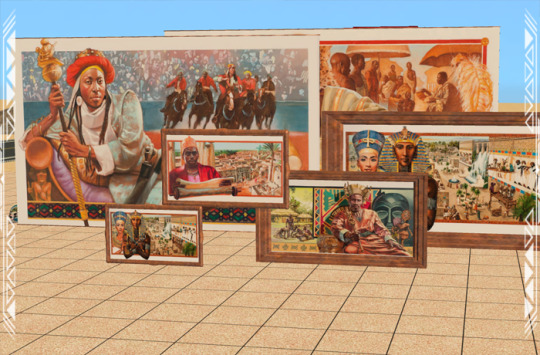
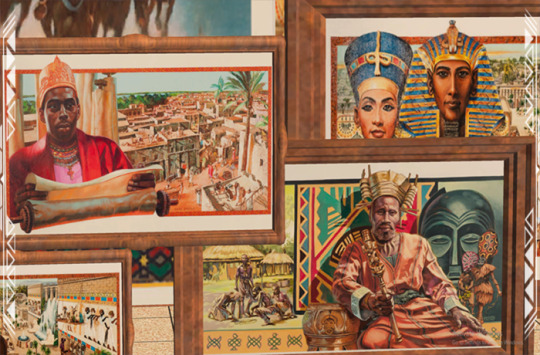
DETAILS Requires Sims 2. Requires Apartment Life for shiftability. §1K-15K | Buy > Deco > Wall Hangings Paintings are centered on 1-tile but cover more tiles than that. They come in various gallery sizes and images have been edited to fit the mesh. After purchase, their value increases by approximately 2% daily – watch out for burglars! Files with “MESH” in their name are REQUIRED. Frame recolors include EA/Maxis and yeti textures. Frame and painting recolors are merged into two files so you’ll have to take them or leave them. ITEMS Great Kings & Queens of Africa: Paintings 001-006 (92-764 poly) DOWNLOAD (choose one) from SFS | from MEGA
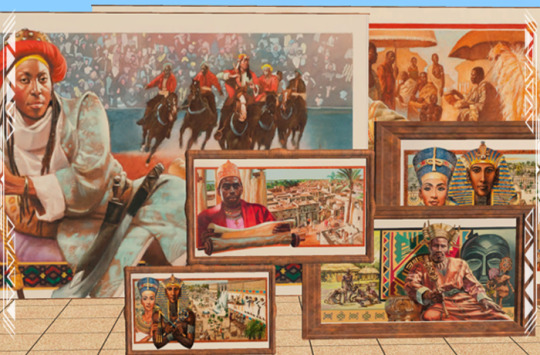
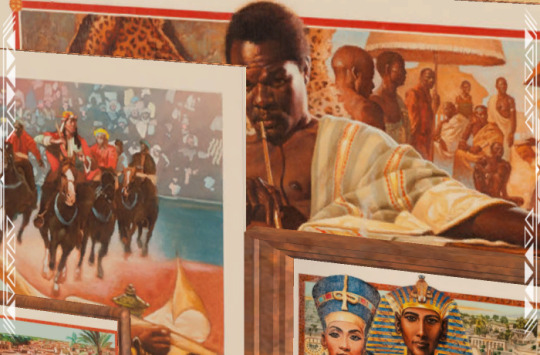
IMAGES
Akhenaton Pharaoh of Egypt (1375-1358 BC) by Barbara Higgins Bond
Alfonso I King of the Kongo (circa 1486-1543) by Carl Owens (1929-2002)
Askia Muhammaed Toure King of Songhay (1493-1529) by Leo Dillon
Benhanzin Hossu Bowelle—The King Shark (1841-1906) by Thomas Blackshear II
Cleopatra VII Queen of Egypt (69-30 BC) by Ann Marshall
Hannibal Ruler of Carthage (247-183 BC) by Charles Lilly
Hatshepsut The Ablest Queen of Far Antiquity (1503-1482 BC) by Dean Mitchell
Idris Alooma Sultan of Bornu (1580-1617) by Charles Lilly (1949-)
Ja Ja King of the Opobo (1821-1891) by Jonathan Knight
Khama III The Good King of Bechuanaland (1819-1923) by Carl Owens
Makeda Queen of Sheba (960 BC) by Debra Edgerton
Mansa Kankan Musa King of Mali (1306-1337) by Barbara Higgins Bond
Menelek II King of Kings of Abyssinia (1844-1913) by Dow Miller
Moshoeshoe King of Batsutoland (circa 1786-1870) by Jerry Pinkney
Mwana Ngana Ndumba Tembo—Ruler of the Angolan Tchokwe (1840-1880 circa) by Kenneth Calvert
Nandi Queen of Zululand (1778-1826 AD) by HM Rahsaan Fort II
Nefertari Nubian Queen of Egypt (192-1225 BC) by Steve Clay
Nehanda of Zimbabwe (1862-1898) by Lydia Thompson
Nzingha—Amazon Queen of Matambo (1582-1663) by Dorothy Carter
Osei Tutu King of Asante (circa 1650-1717) by Alfred Smith
Queen Amina of Zaria (1588-1589) by Floyd Cooper
Samory Toure The Black Napoleon of the Sudan (1830-1900) by Ezra Tucker
Shaka-King of the Zulus (1787-1828) by Paul Collins
Shamba Bolongongo African King of Peace (1600-1620) by Roy LaGrone
Sunni Ali Beer King of Songhay (circa 1442-1492) by Leo Dillon
Taharqa King of Nubia (710-664 BC) by John Thomas Biggers
Tenkamenin King of Ghana (1037-1075 AD) by Alexander Bostic
Thutmose III Pharaoh of Egypt (753-712 BC) by Antonio Wade
Tiye The Nubian Queen of Egypt (circa 1415-1340 BC) by Leonard Jenkins
Yaa Asantewa Queen of Ghana (1863-1923) by Barbara Higgins Bond CREDITS No copyright infringement intended – I own no rights to these images. Artwork and trademarks are the property of their respective creators and/or owners. If this exceeds fair use, please contact me via private message. Thanks: Simming and Sketchfab Communities. Sources: Any Color You Like (CuriousB, 2010), Beyno (Korn via BBFonts), Console Certificates (d_dgjdhh, 2019; 2011), EA/Maxis, Gyeongbokgung Sajeongjeon Painting (National Heritage Administration, 2024 via CCA; Sketchfab), Great Kings and Queens of Africa Series (Anheuser-Busch, Inc., 1975-2000; Kentake, 2016), Offuturistic Infographic (Freepik), Painting by Zdzislaw Beksinski (Sosnowski, 2018 via CCA), Yeti Metals (Shastakiss, 2017).
88 notes
·
View notes
Text
But You're Drunk

pairing: jennifer jareau x fem reader
category: fluff
warnings: none
word count: 753
summary: you're drunk and wanna have sex but jj says no bc you're too drunk to give consent
request by @pidgeispunk: what about after a night out w the team, r gets pretty drunk and jj has to take care of them, get them home and ready for bed etc. r keeps trying to get jj into if ykwim😏 but jj won’t do anything since r is drunk and doesn’t want to take advantage. r is all whiny and begging, but jj just gets her into bed and to sleep
I pinched JJ's cheeks, wiggling then around with my fingers. "Cutie patootie." I giggled, hiccuping before leaning forward to hug her as tight as I could.
"You think I'm a cutie patootie?"
"Mhm. Cute. You cute. Boobs." I looked down at her boobs and licked my lips.
"Ok baby let's get you home."
"Why?"
"You're drunk."
"What? Nooooo." I laughed and stumbled back a bit.
"I've got her." I heard a familiar voice and turned around. It was Penelope!
"Penelope! Don't you think she's cute?" I pinched JJ's cheeks again and she grabbed my hands, pulling them off of her face.
"Ok baby we're gonna go home."
"She's so funny like this."
"JJ...don't wanna go home." I wrapped my arms around her neck and leaned my full body weight against her.
"But we have to babe." I groaned and the rest was a blur but I think Penelope got me to take one more shot.
When we got home JJ insisted that she undressed me. "Noooo just wanna kiss you."
"Baby I'll kiss you but only after you take off your dress, ok?"
"I can't reach." She sighed and unzipped my dress for me. I made no move to go and grab my pajamas.
"What pajamas do you want."
"Naked."
"You wanna sleep naked?"
"No." I giggled and hopped over to her. "Wanna be naked with you. In bed."
"Baby no." She caught onto what I was saying and quickly shot it down.
"Pleaseeeee. I can be quick. I promise." I jumped on the balls of my feet and almost fell over.
"No."
"Pleaseee." She put a finger on my lips and kissed my forehead.
"You're drunk honey. I'm not gonna have sex with you when you're drunk."
"But whyyyy? I want it."
"You're not in the right mind to give me real consent."
"But I said yes though."
"But you're drunk. It's a no honey. And I'm not going to apologize for it." I whined and jumped up and down stubbornly like a toddler. JJ picked me up and put me in bed. "Stay here honey, I'll be back."
"You said you'd give me kisses though."
"I'll give you kisses after you drink some water." I whined but nodded, waiting impatiently on the bed.
When she came back with water I chugged the whole thing just so I could have kisses. JJ kissed my forehead first, cradling my face in her hands. I whined and pouted, squeezing my legs together. "Pretty please? I'll be good."
"I know you'd be good. You're always good for me baby I know that." I blushed. "You're such a good girl baby. But right now I just need you to go to sleep, ok?" I whined but nodded. I wanted to be good for her.
"I want cuddles though."
"You'll always get cuddles my love." I scooted back until JJ could fit on her side of the bed and then hugged her like a koala. I nuzzled my head into her neck and smiled.
"I love you."
"I love you too." I wiggled around as I tried to find a comfortable position, gently kissing and nipping at her neck to keep myself busy. She giggled and ran her fingers through my hair. "Whatcha doing baby?"
"Not comfortable."
"Want me to spoon you instead?"
"Too hot." She sighed and took the covers off of me. I gave her my best puppy eyes and she shook her head.
"Baby I said no. You have to listen to me, ok?" My bottom lip trembled but I didn't want to cry over this. I hid my face in her neck. My emotions were even harder to regulate when I was drunk. "Hey...hey baby? Are you crying?"
"Mhm." I sniffled against her neck.
"What's wrong? Am I making you feel unwanted right now?" I shrugged.
"Just wanna be close to you."
"You are close to me."
"But in a different way." I whined.
"If I took my clothes off would it make you feel better?" I nodded eagerly and moved off of her a bit so she could strip. Once she was naked I crawled on top of her and used her as my mattress.
"Thank you." I mumbled against her skin.
"Of course." She stroked my back and my hair. "Just tell me if you need anything. There's some Advil on your nightstand for the morning, ok?" I nodded and looked up at her with soft eyes.
"I love you." I mumbled. "I love you so much."
"I love you more."
#x reader#criminal minds#jennifer jareau#jennifer jareau x reader#wlw post#lgbtq#jennifer jareau x you
117 notes
·
View notes
Text
Highlighting Information in Textbooks.
Highligthing is always a key part of studying, it help us finding the important informantion faster and easier. But it is a doble-edge sword. If done right, it's amazing. If done wrong, it just makes studying more complicate and make us miss important informantion
How NOT to do it
Highlight entire paragraphs
Higlight with one colour
Highlight only the answers of practise tests questions
How to do it
Have different colours to higlight different things (for example, I use orange for key words, thick lines of yellow for key word's definitions/primary ideas, and thin lines of yellow for secondary ideas and examples)
Dont highlight unnesary words. The important information will stand out without filler words. Example: instead of "Rome was built on 753 BC" hightlight "Rome was built on 753 BC" Now, the key information (Rome/built/753BC) stands out in the sentence. Also, having the sentences reduced to key words without connection forces you to create those conections in your head and can help to get better in redaction of texts.
Highlight the information necessary to understand the topic, not what sentences you need to memorize (understanding is ten times better than memorizing)
How do you highlight?
#study motivation#studyblr#study#study aesthetic#study blog#study-core-101#studyspo#student#study community#studyinspo#studyblr community#study tips#study techniques#study method#studying#studying tips
55 notes
·
View notes
Text
While I do not hesitate to criticize Hesiod's Misogyny Theogony, one aspect we have to give him credits for is the timeline from Greek Mythology.
Now, we do know that timeline in Greek Mythology can be completely messed up sometimes, and cases where we see a figure participating in a certain myth despite the fact that said figure is supposed to be either already dead or not born yet are not uncommon. However, the greeks are clearly separated in certain periods and and age cycles, and time maintains overall a certain continuity.
First of all, the very first myths are all centering around deities: Chaos, Primordial Gods, Titans, Ouranos' defeat, Cronus' Golden Age, Prometheus creating the human, the Titanimachy, the Olympians, Prometheus' punishment;
Then, after the flood, we have a new generation of humans, more specifically of heroes who not only that received a considerable amount of help from the gods, but whose heroic myths involve magical weapons, as well as different monsters and creatures: Cadmus, Perseus and Bellerophon;
Next we have Heracles' generation, where the fantastical and realistic elements are in a relatively proportioned measure: Theseus, Heracles, Jason, Orpheus, Oedipus, Atalanta;
The next stage presents more realistic events. Even when the gods are depicted helping the mortals, the original mythical atmosphere from the previous decades was significantly estompated: Achilles, Odysseus, Agamemnon, Diomedes, Hector, Ajax. The key event is the Fall of Troy, followed by Aeneas' journey who, despite of being a minor figure in the greek myths, receives more importance in the roman ones as the ancestor of Romulus and Remus.
Now, keep in mind the fact that the Trojan War was believed to have taken place somewhere in 1200 BC. The 12th Century BC is known as the Late Bronze Age collapse. Meanwhile, Rome is believed to have been founded in 753 BC by modern calculations, which is close to the time when some of the earliest surviving greek myths and poems were written.
9 notes
·
View notes
Text
Insta Connection (Part 2)
Pairing: Drew Starkey x Reader
Warnings: None of the pictures used are my own. They are found on Google or Pinterest.
Pronouns: She/Her
Masterlist

Tagged: @drewstarkey, @madelyncline, @madisonbaileybabe, @austinnorth55
Liked by beatriceY/L/N, allthingsY/N, and 9, 346, 421 others
Y/N_Y/L/N Breaking News: Drew is slow as fuck. Don’t race with him.
Comments:
obxismylife I love the shenanigans they get up to!
drewstarkey you were the one that distracted me
→ Y/N_Y/L/N I wasn’t doing anything!
→ drewstarkey you and i know that isn’t true
austinnorth55 Maddie, Madison, and I absolutely creamed you guys.
claireisaqueen Are they hanging out bc they are filming season 2 of obx?
→ knowallouterbanks Yes!

Tagged: @drewstarkey, @Y/N_Y/L/N
Liked by lutzmake, starkeyismyhusband, and 3, 234 others
starkeyupdates Drew spotted in Italy at the same time that we know Y/N is filming season five of Teenage Assassin
Comments:
assassinforlife Ahhh, can’t wait for the new season! Anatasia and Grace have to get together this season!
lidtheliv He looks so good in this picture.
Y/Nismyfave They have to be dating!!!
→ maplemable he could just be her friend
→ Y/Nismyfave I’m pretty sure that is her purse over his shoulder so…
→ maplemable that doesn’t mean anything
→ Y/Nismyfave Whatever, you are just jealous.

Tagged: @Y/N_Y/L/N, @hichasestokes, @rudeth, @jonathandavissofficial
Liked by nokookhate, rudeth, and 3, 531, 854 others
drewstarkey never let Y/N take a picture of you. happy birthday rudster
Comments:
Y/N_Y/L/N Where is my photo credit?
→ drewstarkey i think making fun of your photography skills is the credit
→ rudeth Idk what you are talking about. I look great.
→ Y/N_Y/L/N ⬆️See it’s the subject that was the problem, not the artist.
→ drewstarkey i’m hurt pumpkin
obxobsessedgirl Happy Birthday Rudy!
drewsgirl JD’s shoes are so shiny
itshaileylu my bff can take great pictures!

Tagged: @Y/N_Y/L/N
Liked by Y/N_Y/L/N, lupeter, and 34, 753 others
itshaileylu rain days are better with your bff 🌧️☔
Comments:
onthehunt4Y/L/N Rumours has it that Drew was with the girls
haileybiggestfan more people need to get onto her music and stop seeing her as just Y/N’s best friend. her music slaps.
dejitops You should wear more revealing clothes.
→ lupeter Get out of my sister’s comments creep
Taglist: @loves0phelia @thelomlisrafecameron @wickedlovely121 @thepatriarchykeychain @drewsmusee @starkowswife @maybankslover @forstarkey @loving-and-dreaming
#insta connection#drew starkey#drew starkey instagram#drew starkey fanfiction#drew starkey x reader#drew starkey imagine#drew starkey one shot#drew starkey fic#drew starkey social media au#drew starkey insta#drew starkey instagram au#drew starkey series
45 notes
·
View notes
Note
How much do you imagien fashion changed in westeros? Like, the time spans we are given are crazy (like the starks being kings for 8000 years), so do you think it changes slower because of that? Like, how much did style, preferred silhuettes etc change from the conquest to the dance to the war of five kings?
The length of the timeline for the history of Westeros is fucking ridiculous if I'm being honest like...to put it in perspective Rome (as a kingdom to the fallen western empire) lasted from 753 BC to 476 AD, which is just over 1000 full years. And the Starks lasted 8 of those George is so unserious. So to shape it so that it fits my historical realism standards I imagine everything developed much slower than in real life (which was already pretty slow pre-industrial revolution) if we are only just getting to pseudo-medieval fashion by the current time period and there's already been more than 10,000 years of recorded history.
So in the age of heroes, clothing was very slow to evolve due to the need to put other things first. It still developed according to need, but not rapidly. 200 years could pass and someone would be wearing clothing really similar to their ancestors. By the coming of the andals, when there's slightly more stability but still heavy turmoil, there starts to be significant developments that sprout out of both practical environmental needs, and the need to be seen as different from your enemy across the border. By the time of the conquest, things are moving moderately faster, due to the lands being settled and more trade probably going back and forth. Its development has peaks and valleys depending on the Targ king, but for the most part it accelerates much quicker, thanks to the unification of the lands.
#asoiaf hair and clothing#I hate when a book has ridiculous timelines#no one in this current age is going to remember in perfect detail the founder of a dead dynasty from 13000 years ago#it just alienates me sometimes cause im like#recorded history is NOT that much in actuality
41 notes
·
View notes
Text
Religion was shoved not taught
read it on AO3 at https://ift.tt/WHy19Aa by Heart_sweet Nick and Charlie get assaulted from holding hands and mix some angst and religious stuff Words: 753, Chapters: 1/4, Language: English Fandoms: Heartstopper (TV), Heartstopper (Webcomic) Rating: Not Rated Warnings: Creator Chose Not To Use Archive Warnings Categories: Gen, M/M Characters: Nicholas "Nick" Nelson, Charles "Charlie" Spring (Heartstopper), Jane Spring, OC Jane’s mum, Sarah Nelson, Geoff (Heartstopper), Julio Spring, Victoria "Tori" Spring Relationships: Nicholas "Nick" Nelson/Charles "Charlie" Spring, Charles "Charlie" Spring & Jane Spring, Nicholas "Nick" Nelson & Sarah Nelson Additional Tags: Religion, Jane Spring Tries, Charles "Charlie" Spring (Heartstopper) Needs a Hug, Nicholas "Nick" Nelson Needs a Hug, Cross symbol, Jane isn’t Christian but her mother is, ED Recovery, pub, god Jesus is mentioned, I’m doing this bc I’m so called catholic but I don’t believe it, Homophobic Language, the f slur is in it but not filtered but cussing is, Set in vol 6, Catholic and Christian are used interchangeably, This gives of the song Fable slightly, Charles "Charlie" Spring (Heartstopper) has an Eating Disorder, but its not the main focus, Psychological Trauma read it on AO3 at https://ift.tt/WHy19Aa
2 notes
·
View notes
Text
Thoughts on the Itabros Birthday
I like to think that every nation has two birthdays: the day they popped into existence, marking their 'birth' and the day that made them who they represent today (such as a unification or an independence day).
For example, say Veneziano's original birthday is March 25, 421 AD (The Feast of the Annunciation, the traditional founding day of the city of Venice). Romano's original birthday is historically a little more complicated, but knowing that he's canonically much older than Vene, let's just say that his original birthday is April 21, 753 BC (which aligns with the Roman myth of the founding of the city).
With many nations, their original birthdays are lost to time after so long has passed and they have undergone so many changes into their present-day national personifications, so they choose to adopt a new birthday that symbolizes their growth and who they have become.
So, here's my theory. The Itabros didn't get to choose their own modern birthdays. Because the Risorgimento was so tumultuous and uneasy, the government figures and officials thought it would boost morale and make the transition smoother if their personifications showed support of the unification, so they were almost forced to adopt March 17, 1861 as their 'official' modern birthday.
Out of ease and habit, Vene and Roma pretend to publicly celebrate this as their birthday every year. But they have both chosen dates that they identify with more to actually celebrate!
I love the dates that @irl-romano proposed for the Itabros' birthdays! So Veneziano chose June 2, and Romano chose April 25 (but you'll have to check out their post to see why!).
#the way it took me all day to formulate these thoughts#I'm usually not too big into history and nationverse#but the itabros hold a very special place in my heart and I love all aspects of them#aph romano#aph veneziano#itabros#irl-romano#I'd love to hear others' thoughts on this!
6 notes
·
View notes